Hyundai i10 vs VW Tiguan – Differences & prices compared
Compare performance, boot capacity, efficiency and price at a glance.
Find out which car is the better choice for you – Hyundai i10 or VW Tiguan?
Costs and Efficiency:
Price and efficiency are key factors when choosing a car – and this is often where the real differences emerge.
Hyundai i10 has a decisively advantage in terms of price – it starts at 14600 £, while the VW Tiguan costs 32800 £. That’s a price difference of around 18223 £.
Fuel consumption also shows a difference: VW Tiguan manages with 0.40 L and is therefore decisively more efficient than the Hyundai i10 with 4.90 L. The difference is about 4.50 L per 100 km.
Engine and Performance:
Power, torque and acceleration say a lot about how a car feels on the road. This is where you see which model delivers more driving dynamics.
When it comes to engine power, the VW Tiguan has a decisively edge – offering 272 HP compared to 90 HP. That’s roughly 182 HP more horsepower.
In acceleration from 0 to 100 km/h, the VW Tiguan is decisively quicker – completing the sprint in 5.90 s, while the Hyundai i10 takes 11.40 s. That’s about 5.50 s faster.
In terms of top speed, the VW Tiguan performs clearly perceptible better – reaching 242 km/h, while the Hyundai i10 tops out at 175 km/h. The difference is around 67 km/h.
There’s also a difference in torque: VW Tiguan pulls clearly stronger with 400 Nm compared to 172 Nm. That’s about 228 Nm difference.
Space and Everyday Use:
Beyond pure performance, interior space and usability matter most in daily life. This is where you see which car is more practical and versatile.
Both vehicles offer seating for 5 people.
In curb weight, Hyundai i10 is decisively lighter – 996 kg compared to 1599 kg. The difference is around 603 kg.
In terms of boot space, the VW Tiguan offers clearly more room – 652 L compared to 252 L. That’s a difference of about 400 L.
In maximum load capacity, the VW Tiguan performs noticeable better – up to 1650 L, which is about 600 L more than the Hyundai i10.
When it comes to payload, VW Tiguan evident takes the win – 533 kg compared to 423 kg. That’s a difference of about 110 kg.
Who wins the race?
The VW Tiguan proves to be dominates this comparison and therefore becomes our DriveDuel Champion!
VW Tiguan is the better all-rounder in this comparison.

VW Tiguan
Hyundai i10
The Hyundai i10 impresses with its compact design, making it an ideal choice for navigating through busy urban environments. Its interior is surprisingly spacious, offering drivers and passengers comfort beyond what one might expect from a city car. The model combines efficiency and practicality, making it an attractive option for those seeking both economy and functionality in their daily commute.
details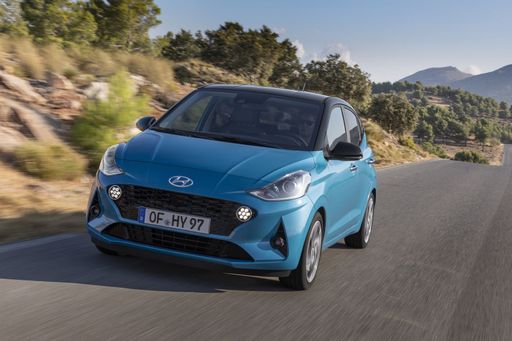 @ hyundai.news
@ hyundai.news
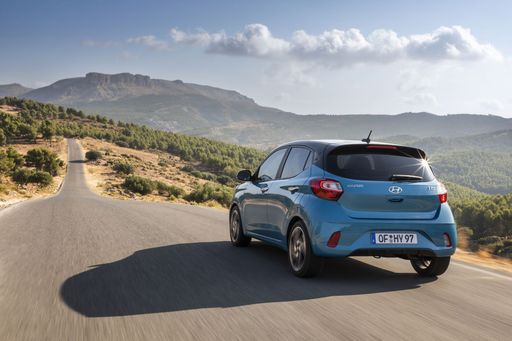 @ hyundai.news
@ hyundai.news
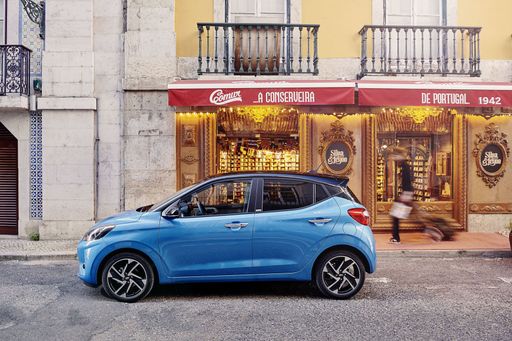 @ hyundai.news
@ hyundai.news
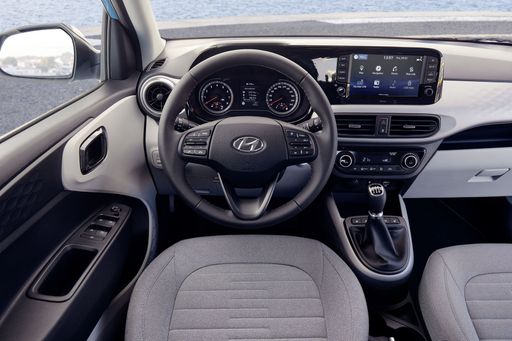 @ hyundai.news
@ hyundai.news
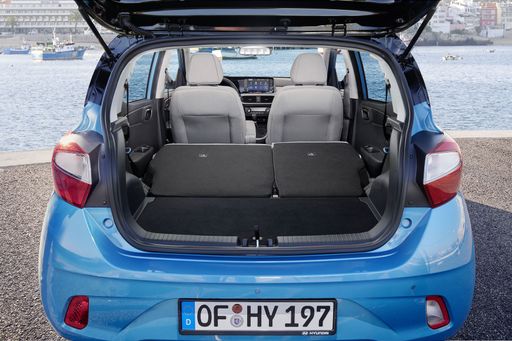 @ hyundai.news
@ hyundai.news
VW Tiguan
The VW Tiguan presents itself as a versatile and practical option in the SUV market, combining a stylish design with a spacious and comfortable interior. It offers a smooth driving experience, making it well-suited for both urban environments and longer journeys. With its focus on safety and innovative technology features, the Tiguan remains a compelling choice for families and adventurers alike.
details @ Volkswagen
@ Volkswagen
 @ Volkswagen
@ Volkswagen
 @ Volkswagen
@ Volkswagen
 @ Volkswagen
@ Volkswagen
 @ Volkswagen
@ Volkswagen
 @ Volkswagen
@ Volkswagen

|

|
|
|
|
Costs and Consumption |
|
|---|---|
|
Price
14600 - 19000 £
|
Price
32800 - 51900 £
|
|
Consumption L/100km
4.9 - 5.5 L
|
Consumption L/100km
0.4 - 8.4 L
|
|
Consumption kWh/100km
-
|
Consumption kWh/100km
-
|
|
Electric Range
-
|
Electric Range
119 - 129 km
|
|
Battery Capacity
-
|
Battery Capacity
19.70 kWh
|
|
co2
110 - 124 g/km
|
co2
8 - 190 g/km
|
|
Fuel tank capacity
36 L
|
Fuel tank capacity
45 - 58 L
|
Dimensions and Body |
|
|---|---|
|
Body Type
Hatchback
|
Body Type
SUV
|
|
Seats
4 - 5
|
Seats
5
|
|
Doors
5
|
Doors
5
|
|
Curb weight
996 - 1099 kg
|
Curb weight
1599 - 1890 kg
|
|
Trunk capacity
252 L
|
Trunk capacity
490 - 652 L
|
|
Length
3670 - 3675 mm
|
Length
4539 mm
|
|
Width
1680 mm
|
Width
1842 - 1859 mm
|
|
Height
1480 - 1483 mm
|
Height
1656 - 1658 mm
|
|
Max trunk capacity
1050 L
|
Max trunk capacity
1486 - 1650 L
|
|
Payload
344 - 423 kg
|
Payload
460 - 533 kg
|
Engine and Performance |
|
|---|---|
|
Engine Type
Petrol
|
Engine Type
Plugin Hybrid, Petrol, Petrol MHEV, Diesel
|
|
Transmission
Manuel, Automatic
|
Transmission
Automatic
|
|
Transmission Detail
Manual Gearbox, Automated Manual
|
Transmission Detail
Dual-Clutch Automatic
|
|
Drive Type
Front-Wheel Drive
|
Drive Type
Front-Wheel Drive, All-Wheel Drive
|
|
Power HP
63 - 90 HP
|
Power HP
130 - 272 HP
|
|
Acceleration 0-100km/h
11.4 - 18.4 s
|
Acceleration 0-100km/h
5.9 - 10.6 s
|
|
Max Speed
143 - 175 km/h
|
Max Speed
198 - 242 km/h
|
|
Torque
93 - 172 Nm
|
Torque
220 - 400 Nm
|
|
Number of Cylinders
3 - 4
|
Number of Cylinders
4
|
|
Power kW
46 - 66 kW
|
Power kW
96 - 200 kW
|
|
Engine capacity
998 - 1197 cm3
|
Engine capacity
1498 - 1984 cm3
|
General |
|
|---|---|
|
Model Year
2024
|
Model Year
2024 - 2025
|
|
CO2 Efficiency Class
C, D
|
CO2 Efficiency Class
B, G, D, E, F
|
|
Brand
Hyundai
|
Brand
VW
|
Is the Hyundai i10 offered with different drivetrains?
The Hyundai i10 is offered with Front-Wheel Drive.
The prices and data displayed are estimates based on German list prices and may vary by country. This information is not legally binding.
